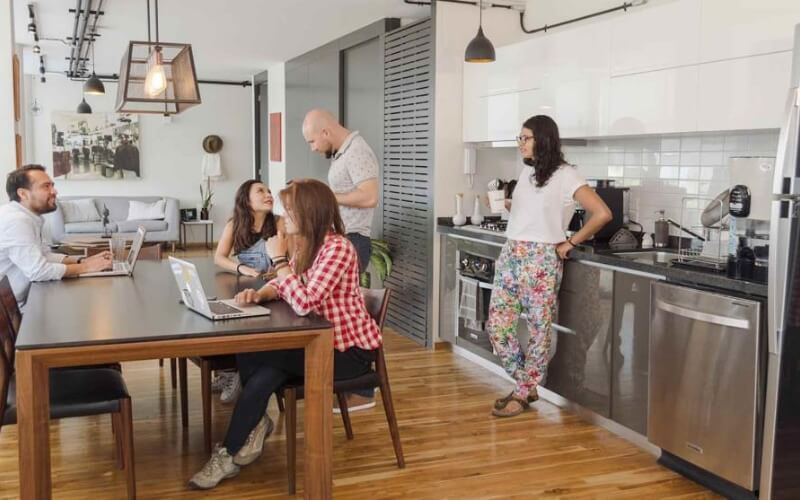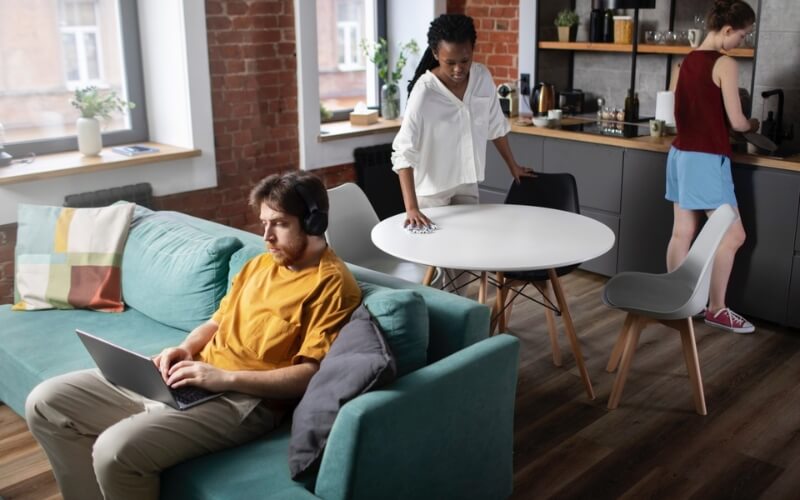
Pros and Cons of Coliving for Digital Nomads
For digital nomads seeking community while maintaining location independence, coliving presents a unique lifestyle choice. This comprehensive guide explores the advantages and challenges of coliving arrangements, helping remote professionals decide if this modern housing solution aligns with their work-life aspirations.
What Defines a Modern Coliving Space
A coliving space is a place where people, especially digital nomads, can live and work together. It’s kind of like a combination of a hostel, a coworking space, and an Airbnb.
There are different types of coliving spaces, including:
- Shared rooms with bunk beds (dormitory style).
- Private rooms for one person.
- Shared apartments.
- Private apartments for one person.
Coliving spaces can be in many forms, such as villas, converted boutique hotels, or apartment buildings. You can find them in both cities and countryside locations. They come in different price ranges, from budget-friendly to luxury, with amenities like swimming pools, gyms, and cafes. The cost can vary from $100 to $500 per week, depending on what’s included. No matter the price, these spaces are usually fully furnished, so you have everything you need to live and work comfortably.

How Do Pros and Cons of Coliving Impact Digital Nomad Lifestyle?
What Are the 5 Major Benefits of Coliving for Digital Nomads?
- Easy way to make friends and connections: When you’re traveling and working remotely, it can be hard to make friends. Coliving spaces are full of other digital nomads who are also looking for company, so it’s easy to find people to hang out with, go on adventures, or even brainstorm ideas for work. Many coliving spaces organize social events like dinners or tours of the area, which makes it even easier to make friends without needing to plan things yourself.
- Flexible living arrangements: Coliving spaces are designed to be flexible for travelers. You don’t need to worry about long leases, and some even allow you to check in and out as you like, almost like a hotel. This can be very helpful for digital nomads who like to move from one place to another without a lot of planning.
- Networking with other professionals: Coliving spaces are popular with professionals who work remotely, so there are usually plenty of chances to meet people working in interesting fields. You may even find people who can help you with projects or give you advice. This makes coliving a great place to build your professional network.
- All-Inclusive amenities: Most coliving spaces come with everything you need, from internet and workspace to utilities, cleaning, and sometimes even laundry. This can save you time and hassle, allowing you to focus on work and exploring your new city without worrying about setting things up.
- Safety and security: If you’re traveling solo, safety can be a concern, and coliving spaces can provide a secure environment. You’re around other people, which can make you feel safer, and many coliving spaces are well-established, so you won’t have to worry as much about dealing with private landlords in a new country.
Discover Related Guides: How to Deal with Culture Shock While Studying Abroad
What Challenges Do Digital Nomads Face in Coliving Spaces?
- Limited privacy: While coliving can be great for making friends, it can also mean limited personal space. Many coliving spaces have shared common areas that are almost always full of people, and some even have shared bedrooms. If you’re someone who needs a lot of alone time, this can feel overwhelming.
- Frequent goodbyes: people come and go all the time in coliving spaces. This can make it difficult to build deep friendships, as some of the friends you make might only be there for a short time. While social media can help you stay in touch, it can still be tough to say goodbye to people who may soon be on the other side of the world.
- Can limit cultural immersion: Because coliving spaces are filled with other expats and digital nomads, it can sometimes feel like you’re in a bubble. You might not feel as much of a need to meet local people or practice the language if everyone around you is also a foreigner. While it’s nice to feel at home with others like you, it can also mean missing out on the local culture.
- Higher cost compared to local rentals: Coliving spaces can be pricier than renting an apartment from a local landlord. The cost includes amenities like cleaning and utilities, but if you’re planning to stay for several months, it may be more budget-friendly to find a place of your own. It’s a good idea to make a budget and see which option fits your plans best.

How to Decide if Coliving Matches Your Digital Nomad Lifestyle: 5 Key Indicators
Living in a co-living space could be a great fit for you if…
- You enjoy meeting new people and making friends.
- You’d like things to be mostly set up and ready for you when you move in.
- You need flexible options for how long you can stay, whether it’s just for a short visit or a long stay.
- You like joining social activities and networking events.
- You don’t have pets with you (pet-friendly spaces can be hard to find, though not impossible).
Co-living spaces are designed to make life easier and connect you with others, so if that sounds good, this might be a perfect choice!
Continue Learning: 5 Cool Jobs Abroad for First-Time Expats
FAQs
What is the difference between coworking and Coliving?
| Aspect | Coworking | Coliving |
| Purpose | Coworking spaces are designed mainly for work. They offer a professional setting where you can rent a desk or workspace to focus on projects and tasks. | Coliving spaces combine both living and working environments. They offer a place to stay, along with work areas, creating a home-like atmosphere for people who work remotely. |
| Amenities | Coworking spaces generally provide work-focused amenities like high-speed internet, meeting rooms, printers, and sometimes coffee and snacks. | Coliving spaces include both work and home amenities, such as bedrooms, kitchens, laundry rooms, common social spaces, and sometimes gyms or pools. |
| Community | Coliving spaces prioritize social interaction and building a community. Residents often eat together, join in group activities, and get to know each other well, creating a close-knit atmosphere. | Coliving spaces prioritize social interaction and building a community. Residents often eat together, join in group activities, and get to know each other well, creating a close-knit atmosphere. |
| Flexibility | Coworking spaces usually offer flexible memberships, like daily or monthly passes, so you can choose what suits you best. | Coliving spaces offer flexible stays, from short visits to extended stays, without long-term commitments, making it easy to move in or out as you need. |
What is the downside of being a digital nomad?
One downside of being a digital nomad is that it can get lonely. When you’re always moving to new places, it’s hard to keep close friends. You might meet great people along the way, but they may only stay for a short time before they move on too. This lifestyle also means leaving behind family and friends back home, which can be tough.
Another challenge is the lack of stability. Since you’re always moving, you may not have a steady place to call home. This can be exciting, but it can also feel tiring, especially when you have to keep packing up, finding new places to live, and adjusting to different cultures and time zones. Not to mention, some digital nomads find it hard to stay focused on work with so many new places to explore.
So while being a digital nomad can be fun and full of adventure, it’s not always easy, and it’s not the right fit for everyone.

Is coliving profitable?
Yes, coliving can be quite profitable! For companies and property owners, coliving is profitable because it allows them to rent out smaller spaces to more people at higher prices per square foot than traditional rentals. By offering shared amenities, like kitchens, lounges, and workspaces, coliving spaces can attract young professionals, digital nomads, and people looking for affordable housing in big cities. This shared setup also helps reduce costs while creating a unique living experience.
For tenants, coliving can save money on utilities, furniture, and amenities that would cost extra in a regular apartment. These savings, combined with the social and networking benefits, make coliving an attractive option for many.
Coliving offers a lot of great benefits, especially for those looking to connect with others and live with convenience. However, it’s important to weigh the downsides to decide if it aligns with your needs as a digital nomad.






